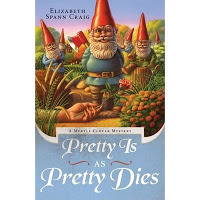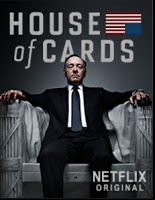Elizabeth Spann Craig's Blog, page 154
June 19, 2013
Subplots
by Elizabeth S. Craig, @elizabethscraig
 Today I'm over at Jordan McCollum's blog, talking a little about subplots: what makes for a great
Today I'm over at Jordan McCollum's blog, talking a little about subplots: what makes for a great
subplot, tips for including them in your story, and a few resources to learn more about writing subplots. Hope you'll pop over.
 Today I'm over at Jordan McCollum's blog, talking a little about subplots: what makes for a great
Today I'm over at Jordan McCollum's blog, talking a little about subplots: what makes for a great
subplot, tips for including them in your story, and a few resources to learn more about writing subplots. Hope you'll pop over.
Published on June 19, 2013 07:45
June 16, 2013
How to Promote Books and Win Fans
by Jason Kong, @storyrally

Most fiction writers hate marketing their books.
You have to tread the line between awareness and overhyping. Because you have a vested interest in selling your work, others sometimes assume you're just out to make a buck.
Book promotion doesn't always have to be so unpleasant.
If you have published books and an online platform, then you also have a following. You have readers paying attention because they value your storytelling.
Instead of plugging your books all the time, why not recommend those of your fellow authors? It's a promotion opportunity you can feel good about.
The genuine endorsement
You know what this is like.
Remember the last time you read a novel that really grabbed you. You had to tell a friend, right? It's about finding that person who would enjoy the book as much as you did.
You weren't driven by a commission or reciprocation. The intention was to spread the joy, to make someone else's life a little better.
A book recommendation without expectation is a special kind of promotion. It had nothing to do with who wrote the book, and everything to do with whether the recipient would benefit.
So how does that translate into a professional setting?
Good feelings all around
Other authors are not your competitors. Maybe that was true once upon a time, but not anymore.
You're no longer fighting writers for a spot on the shelf. Digital media and self-publishing means the available space for books is now stretched to infinity.
Touting that you're the only author worth following is self-serving, but hardly true. Fiction isn't a commodity. Everyone has room to like more than one story or more than one author.
Writing, especially good writing, takes a lot of time. If you have a communication channel with your audience, then how are you rewarding their attention between projects?
 When you come across a good story in your genre, use social media to share a good word. Make recommendations because you're confident enough in your ability and generous enough in your motivation.
When you come across a good story in your genre, use social media to share a good word. Make recommendations because you're confident enough in your ability and generous enough in your motivation.
With that mindset, you won't have less fans. You'll have more.
Jason Kong (@storyrally) helps fiction writers build better online platforms. Sign up for his free newsletter here.

Most fiction writers hate marketing their books.
You have to tread the line between awareness and overhyping. Because you have a vested interest in selling your work, others sometimes assume you're just out to make a buck.
Book promotion doesn't always have to be so unpleasant.
If you have published books and an online platform, then you also have a following. You have readers paying attention because they value your storytelling.
Instead of plugging your books all the time, why not recommend those of your fellow authors? It's a promotion opportunity you can feel good about.
The genuine endorsement
You know what this is like.
Remember the last time you read a novel that really grabbed you. You had to tell a friend, right? It's about finding that person who would enjoy the book as much as you did.
You weren't driven by a commission or reciprocation. The intention was to spread the joy, to make someone else's life a little better.
A book recommendation without expectation is a special kind of promotion. It had nothing to do with who wrote the book, and everything to do with whether the recipient would benefit.
So how does that translate into a professional setting?
Good feelings all around
Other authors are not your competitors. Maybe that was true once upon a time, but not anymore.
You're no longer fighting writers for a spot on the shelf. Digital media and self-publishing means the available space for books is now stretched to infinity.
Touting that you're the only author worth following is self-serving, but hardly true. Fiction isn't a commodity. Everyone has room to like more than one story or more than one author.
Writing, especially good writing, takes a lot of time. If you have a communication channel with your audience, then how are you rewarding their attention between projects?
 When you come across a good story in your genre, use social media to share a good word. Make recommendations because you're confident enough in your ability and generous enough in your motivation.
When you come across a good story in your genre, use social media to share a good word. Make recommendations because you're confident enough in your ability and generous enough in your motivation.With that mindset, you won't have less fans. You'll have more.
Jason Kong (@storyrally) helps fiction writers build better online platforms. Sign up for his free newsletter here.
Published on June 16, 2013 21:01
June 15, 2013
Twitterific
by Elizabeth S. Craig, @elizabethscraig

Twitterific links are fed into the Writer’s Knowledge Base search engine
(developed by writer and software engineer Mike Fleming) which has over 20,000
free articles on writing related topics. It's the search engine for writers.
Sign up for our free newsletter for monthly
writing tips and interviews with top contributors to the WKB or like us on Facebook.
Mike Fleming worked with author and
writing coach James Scott Bell to offer an online, interactive, writing program
to help make your next novel great. It's called "Knockout Novel" and
you can learn more about it at Knockout
Novel.com.
Jailhouse deaths in crime fiction: http://bit.ly/11aqTzH
@mkinberg
Downsides to using pseudonyms: http://bit.ly/12fX3Pb
@spunkonastick
Tackling a first draft: http://bit.ly/11TiCic
@JoannaShupe
Both publishers and authors should tone down rhetoric,
anger: http://bit.ly/ZH0Br2 @Porter_Anderson @DavidGaughran @timdavies1998
There's No Such Thing as Good Writing: http://bit.ly/11xF0iv
@theAtlantic @joefassler @craignova
When our stories give off unintended implications
(regarding race, misogyny, etc.) http://bit.ly/18wX0C2 @PAShortt
Falling out of love with writing: http://bit.ly/192KHdl
@billycoffey @RachelleGardner @Porter_Anderson
Chick-lit will survive - but don't count all female
authors in: http://bit.ly/18wwDMo @KatyFBrand
3 useful additions to your mystery: http://bit.ly/18wGhic
@lindasclare
The mounting pressure on authors to write faster: http://bit.ly/1ac7btW
@Porter_Anderson @cjlyonswriter @jamesscottbell
How to Lengthen Your Nonfiction Book When You Feel Like
You've Said Everything: http://bit.ly/18JZGMM @jevonbolden
Ways to Announce That You’re a Successful, Unpublished
Writer (And Have The World Agree): http://bit.ly/17bCS8b @grubwriters
The Secret Recipe for Writing a Perfect
Pitch: http://bit.ly/16D7PSj @kristenlambtx
Blurb etiquette: http://bit.ly/14nBkAE @rachellegardner
How to Approach a Literary Agent: http://bit.ly/16D7WNC @bubblecow
The Writer's Vices: http://bit.ly/14nBw2H @storydepartment
4 Ways to Improve Your Prose: http://bit.ly/16D89QW
5 Tips to Help You Make Your Deadline: http://bit.ly/14nBPKW @writersdigest
What You Stand to Gain from Sharing Your
Dirty Laundry: http://bit.ly/16D8d3k
5 Things Indie Authors Do Very Well: http://bit.ly/14nC2O5 @alisonbav
The daily routine of Sylvia Plath: http://bit.ly/16D8nHO @Explorer
Revision tips: http://bit.ly/16D8wen @amsmibert
@LeagueWriters
Interactive novels: pretty but pretty
exhausting: http://bit.ly/16DbKyy
@guardianbooks
Tips for Twitter and ways to keep it from
driving us crazy: http://bit.ly/14nHfFJ
@kristenlambtx
Uncomfortable Social Media: http://bit.ly/14nHkcq @jgetzler
Does Your Website Reflect Where You Are
in Your Career? http://bit.ly/16DbU99
@hostbaby
Boundary setting for sensitives and
writers: http://bit.ly/14nHzV9 @jennaavery
Editing Tips and Tricks: http://bit.ly/16DbYWz @bethrevis
Managing Critique in Writing Workshops: http://bit.ly/14nHSz6 @BTMargins
Planning Your Marketing as You Write Your
Novel: http://bit.ly/14nI4yi @dineenmiller
@livewritethrive
5 Authors Who Prove It's Never Too Late
To Start Writing: http://bit.ly/16Dcd3P
@kimber_regator
How Many Books Would You Have To Write To
Quit Your Job? http://bit.ly/14nIdSu
@woodwardkaren
What Batman Can Teach You About
Proofreading: http://bit.ly/16DcfZq
Getting the Most out of Smashwords: http://bit.ly/16DcmUW @AuthorKSBrooks
The Most Important Thing Literary Agents
Owe Their Clients: http://bit.ly/14nIzZ9
@jamesscottbell
Heroes Should Ascend, Not Descend: http://bit.ly/16DcuDO @cockeyedcaravan
Story breakdown: Sense and Sensibility: http://bit.ly/14nJ4Tb
How Paradoxes Deepen Character: http://bit.ly/16DcKmq @shalvatzis
5 Principles for Dialogue That Delivers: http://bit.ly/16DcP9F @mythicscribes
The Author Exploitation Business: http://bit.ly/14nJqcj @davidgaughran
Stress for writers: http://bit.ly/17fY107
The importance of instilling a need to
read: http://bit.ly/16Ddjwg
@JDLiteracyTrust @telegraph
How 1 writer got her writing groove back:
http://bit.ly/14nL9P5 @KSElliott_Shark
The fractured writer: http://bit.ly/16DdVSQ @sarahahoyt
Changing the Image of Self-Publishing: http://bit.ly/14nLzEU @IPPYmag @tpersun
An analysis of a book's beginning: http://bit.ly/14nLFwf @janice_hardy
Get One Link To Your Book In All
International Amazon Stores: http://bit.ly/17SpSnO
A screenwriter on a scene he'd written
for Cheers (and a joke that fell flat at the time): http://bit.ly/11zoNIj @KenLevine
The Dos and Don'ts of Dialect: http://bit.ly/11zoWLI @KMWeiland
Agent stalking: http://bit.ly/17SqCcG and a response from the
stalkee: http://bit.ly/17Sqz0t @literaticat
@StinaLL
Chuck Wendig On Finding Your Voice: http://bit.ly/11zpbGw @woodwardkaren
So Bad They're Good: Sympathizing with
the Bad Guy: http://bit.ly/17SrQod @quippy
@crimehq
Why is the hero or heroine so often the
least interesting character in the book? http://bit.ly/17SI3d5
@melissadonovan
Bad Revision, in 3 Easy Steps: http://bit.ly/17SIeoX @victoriamixon
10 things you can do with a Kindle--10
things you can't: http://bit.ly/11zxmTx and
http://bit.ly/11zxn9L @AuthorKatherine
Build a better blog: Resources to start
with: http://bit.ly/17SITGN @amytschubert
10 Ways to Find Inspiration for Fantasy
Writing: http://bit.ly/11zxxho @The_Drill99
Atmosphere in a Southern Gothic: http://bit.ly/11zxQcf @MartinaABoone
@tessagratton
Lessons From a Book Signing: http://bit.ly/17SKfRN
Greek myth in Game of Thrones: http://bit.ly/11zyg2l @DelReySpectra
3 lessons for writers to learn from
marketers: http://bit.ly/17SKQ6d
10 Essential Neo-Noir Authors: http://bit.ly/17SL0dP @flavorwire
Writer's groups: http://bit.ly/17SLlNB @CuriosityQuills
Using Fantasy Agent Responses as a
Writing Tool: http://bit.ly/11zyGpi
@juliabucks
Trying out Authorgraph.com to digitally
sign & doodle autographs: http://bit.ly/17SP25L
@inkyelbows
A review of commas: http://bit.ly/11zArmw @BryanThomasS
Top 20 Picture Book Agents: 171 Sales: http://bit.ly/17kOPaD @fictionnotes
How to Use Pinterest Analytics: 6 Metrics
Worth Measuring: http://bit.ly/1aZrV5L
@smexaminer
Classification Necessary: Problems with
Horror Films: http://bit.ly/1aZsj4e
Character arc: http://bit.ly/1aZsw7A
Character Archetypes 101: The Explorer: http://bit.ly/17kPkBr @jeanniecampbell
Energize your writing with verbs: http://bit.ly/1aZsFIi @write_practice
Write Tight: http://bit.ly/1aZsLQb @EarlStaggs
Creating likeable characters: http://bit.ly/17kPBV2 @sdwriter
How to Pitch an Agent in Person: http://bit.ly/15AhzrT @carlywatters
All about New Adult lit: http://bit.ly/15AhJ2G @wordforteens
Write, Learn, Revise, Rinse, Repeat: http://bit.ly/15Ai8Sv @atrueblood5
Freelancers--how to master a query
letter: http://bit.ly/12sdglA @LFormichelli
How to Stay Focused in a World of
Distraction: http://bit.ly/15Ait7I @CarlaYoung
10 Great Commencement Speeches by
Writers: http://bit.ly/12sdnh8 @bookriot
@JoshACorman
The Complexity of the Creative
Personality: http://bit.ly/15Aj6hQ
@PsychCentral @DouglasEby
The Complicated Relationship Between
Horror and Video Games: http://bit.ly/15AjlJy
@GamerGirlTay
Life cycle of a novel: http://bit.ly/12seihA @amazingstories0
Pinterest Tip: How to Shape-Shift and
Frame Images: http://bit.ly/15AmAki
@bloggingbistro
Writing meaningful dialogue: http://bit.ly/12sd9Xk @scriptmag
Character Archetypes 101: The Explorer: http://bit.ly/17kPkBr @jeanniecampbell
Do writers need agents? http://bit.ly/12sev4f @CMKaufman
Launching a Blog Is Easier Than You
Think: http://bit.ly/15An4XH @jeffgoins
Non-compete clauses: http://bit.ly/12sfpOk @passivevoiceblg
25 Helpful Writerly and Twitter Terms: http://bit.ly/15AqCcz @ava_jae
Why use simple words? Because it's easier
to control connotations. http://bit.ly/12sfxx2
@juliettewade
The asterisk: http://bit.ly/12sfAZT @justinedell
Plot Structure Chart: http://bit.ly/15Arm14 @carrieryan
Writing is a Humiliation Banquet: http://bit.ly/12sfKjU @SaraMTaber
Your book in one sentence: http://bit.ly/15ArHAU @mooderino
5 Ways To Stay Motivated in Your Writing
Career: http://bit.ly/13FDhJS @bookbaby
Straying From the Party Line: Casablanca:
http://bit.ly/13FDv3N @cockeyedcaravan
8 Must Have Elements in Your Newsletter's
Subscriber Welcome: http://bit.ly/13FK8mD
@karencv
How to Create Tension Through
Misdirection: http://bit.ly/18Ww4uP
@writersdigest
Author Beware: Self-Publishing Book Scams
Abound: http://bit.ly/13FKnhy @janvbear
8 Places to Get Inspired Online: http://bit.ly/13FKx8y @emilywenstrom
How To Maximize Your Word Count And Write
More Every Day {Lang.}: http://bit.ly/13FKF7X
@chuckwendig
Are Tense Shifts Advisable? http://bit.ly/13FKMAD @writing_tips
What Do Authors Have in Common with
Orchestra Conductors? http://bit.ly/13FM8LB
@fcmalby
The staleness of historical romance: http://bit.ly/13FMkuk @dearauthor
Social Media for Writers: A Kool-Aid
Drinking Cult? http://bit.ly/13FMuBS
@jodyhedlund
Screenwriters--how to be serious about
your writing career: http://bit.ly/13FMEJF
How Long Does it Take to Edit a Novel? http://bit.ly/13FMLF1 @patbertram
8 ways to take the pain out of writing
slideshows: http://bit.ly/18WBgyJ
@MichelleRafter
5 Ways to Get Your Book into Bookstores: http://bit.ly/18WBplL @bookmarketer
7 Types of Plots: The Quest: http://bit.ly/13FN2HU @write_practice
Is your query trying to tell you
something about your manuscript? http://bit.ly/17q3IIT
@RC_Lewis
Flexing your verbs: http://bit.ly/18PO2fQ @woodwardkaren
How To Get Over A Destructive Critique: http://bit.ly/18ZJ2aV @woodwardkaren
No, E-book Sales Are Not Declining: http://bit.ly/12UBnWs @nathanbransford
Creating a catastrophe plan for our
writing: http://bit.ly/ZqJFat @bob_mayer
Does your picture book premise have
power? A checklist: http://bit.ly/ZqKwI5
@jeanreidy
Rags to Riches plots: http://bit.ly/10Korjb @write_practice
How Retailers Fight Back Against Shoppers
Who Use Them As Showrooms: http://bit.ly/13ncVNI
@RWW @TheTechScribe
Does a good query equal a good novel? http://bit.ly/18ZNfvj @SharonBayliss
3 YA Sub-Genres That Should Exist: http://bit.ly/13nd1Fk @BooksAreMyBFs @bookriot
Pay Closer Attention To YouTube: http://bit.ly/18ZNPcq @mitchjoel
What makes a good book adaptation? http://bit.ly/13ndeIq @guardianbooks
@alanyuhas
How to Make a Video with Google Hangouts:
http://bit.ly/13ndyqO @freelanceswitch
Why steampunk cons can be confusing for
genre authors: http://bit.ly/18ZOPxl
5 tropes 1 writer likes: http://bit.ly/18ZOURC @mistymassey
Just keep writing: http://bit.ly/18ZPnTY @YAStands
The most incongruous book covers of all
time: http://bit.ly/12fZtgC @guardianbooks
The 24 types of journal entry when
Journaling for Creativity: http://bit.ly/12ga5w0
@J4Creativity
How To Write Whether You Feel Like it Or
Not: http://bit.ly/11RLbwF @joebunting
Where to find cover artists: http://bit.ly/ZH23d6 @woodwardkaren
How Prog Rock Influenced Writers: http://bit.ly/11TnlAA @galleycat
Self-pub insights from a Q&A with a
successful MG author: http://bit.ly/ZH2eVD
@diymfa @EricDelaBarre
Driving your Young Adult Novel's Plot: http://bit.ly/11Tny70 @howtowriteshop
Write Hot, Edit Cold? It's Still Great
Advice: http://bit.ly/ZH2rbv @noveleditor
The Year of The Bookstore: http://bit.ly/ZH2vYU @kristinerusch
Publishers Should Empower Authors to Sell
Their Own E-books: http://bit.ly/11TnSme
@nathanbransford
Wills in Author Estate Planning: http://bit.ly/ZH2HqT @susanspann
What House-Sitting Teaches You About
Writing: http://bit.ly/11To0Cb @KMWeiland
@JessBaverstock
Sustaining Your Creativity During Fiction
Withdrawals: http://bit.ly/11ToqbK
@jessbaverstock @vgrefer
Did Your Project Stall? http://bit.ly/ZH3c4k @jillkemerer
The end of the print run: http://bit.ly/11TowQF @deanwesleysmith
Revealing your story's ending in your
synopsis: http://bit.ly/11ToCrs
@Dear_Editor
Finding DIY Authors: http://bit.ly/11TJ4bF @heroesnhearts
Fantasy Meets Crime Fiction: http://bit.ly/11TJleE @crimehq
6 tips for better tweeting: http://bit.ly/11TJrmC @mybookshepherd
An agent on copyright: http://bit.ly/ZHn5rV @Janet_Reid
Pulitzer Prize: huge sales neither
required nor guaranteed: http://bit.ly/11TJFdv
@csmonitor
Putting Passion in the Pages: http://bit.ly/11TJO0r @livewritethrive
How the Act of Writing Changes Your
Ideas: http://bit.ly/ZHnpqI @JessBaverstock
9 agents tell what they're looking for: http://bit.ly/11TK2EL @MartinaABoone

Twitterific links are fed into the Writer’s Knowledge Base search engine
(developed by writer and software engineer Mike Fleming) which has over 20,000
free articles on writing related topics. It's the search engine for writers.
Sign up for our free newsletter for monthly
writing tips and interviews with top contributors to the WKB or like us on Facebook.
Mike Fleming worked with author and
writing coach James Scott Bell to offer an online, interactive, writing program
to help make your next novel great. It's called "Knockout Novel" and
you can learn more about it at Knockout
Novel.com.
Jailhouse deaths in crime fiction: http://bit.ly/11aqTzH
@mkinberg
Downsides to using pseudonyms: http://bit.ly/12fX3Pb
@spunkonastick
Tackling a first draft: http://bit.ly/11TiCic
@JoannaShupe
Both publishers and authors should tone down rhetoric,
anger: http://bit.ly/ZH0Br2 @Porter_Anderson @DavidGaughran @timdavies1998
There's No Such Thing as Good Writing: http://bit.ly/11xF0iv
@theAtlantic @joefassler @craignova
When our stories give off unintended implications
(regarding race, misogyny, etc.) http://bit.ly/18wX0C2 @PAShortt
Falling out of love with writing: http://bit.ly/192KHdl
@billycoffey @RachelleGardner @Porter_Anderson
Chick-lit will survive - but don't count all female
authors in: http://bit.ly/18wwDMo @KatyFBrand
3 useful additions to your mystery: http://bit.ly/18wGhic
@lindasclare
The mounting pressure on authors to write faster: http://bit.ly/1ac7btW
@Porter_Anderson @cjlyonswriter @jamesscottbell
How to Lengthen Your Nonfiction Book When You Feel Like
You've Said Everything: http://bit.ly/18JZGMM @jevonbolden
Ways to Announce That You’re a Successful, Unpublished
Writer (And Have The World Agree): http://bit.ly/17bCS8b @grubwriters
The Secret Recipe for Writing a Perfect
Pitch: http://bit.ly/16D7PSj @kristenlambtx
Blurb etiquette: http://bit.ly/14nBkAE @rachellegardner
How to Approach a Literary Agent: http://bit.ly/16D7WNC @bubblecow
The Writer's Vices: http://bit.ly/14nBw2H @storydepartment
4 Ways to Improve Your Prose: http://bit.ly/16D89QW
5 Tips to Help You Make Your Deadline: http://bit.ly/14nBPKW @writersdigest
What You Stand to Gain from Sharing Your
Dirty Laundry: http://bit.ly/16D8d3k
5 Things Indie Authors Do Very Well: http://bit.ly/14nC2O5 @alisonbav
The daily routine of Sylvia Plath: http://bit.ly/16D8nHO @Explorer
Revision tips: http://bit.ly/16D8wen @amsmibert
@LeagueWriters
Interactive novels: pretty but pretty
exhausting: http://bit.ly/16DbKyy
@guardianbooks
Tips for Twitter and ways to keep it from
driving us crazy: http://bit.ly/14nHfFJ
@kristenlambtx
Uncomfortable Social Media: http://bit.ly/14nHkcq @jgetzler
Does Your Website Reflect Where You Are
in Your Career? http://bit.ly/16DbU99
@hostbaby
Boundary setting for sensitives and
writers: http://bit.ly/14nHzV9 @jennaavery
Editing Tips and Tricks: http://bit.ly/16DbYWz @bethrevis
Managing Critique in Writing Workshops: http://bit.ly/14nHSz6 @BTMargins
Planning Your Marketing as You Write Your
Novel: http://bit.ly/14nI4yi @dineenmiller
@livewritethrive
5 Authors Who Prove It's Never Too Late
To Start Writing: http://bit.ly/16Dcd3P
@kimber_regator
How Many Books Would You Have To Write To
Quit Your Job? http://bit.ly/14nIdSu
@woodwardkaren
What Batman Can Teach You About
Proofreading: http://bit.ly/16DcfZq
Getting the Most out of Smashwords: http://bit.ly/16DcmUW @AuthorKSBrooks
The Most Important Thing Literary Agents
Owe Their Clients: http://bit.ly/14nIzZ9
@jamesscottbell
Heroes Should Ascend, Not Descend: http://bit.ly/16DcuDO @cockeyedcaravan
Story breakdown: Sense and Sensibility: http://bit.ly/14nJ4Tb
How Paradoxes Deepen Character: http://bit.ly/16DcKmq @shalvatzis
5 Principles for Dialogue That Delivers: http://bit.ly/16DcP9F @mythicscribes
The Author Exploitation Business: http://bit.ly/14nJqcj @davidgaughran
Stress for writers: http://bit.ly/17fY107
The importance of instilling a need to
read: http://bit.ly/16Ddjwg
@JDLiteracyTrust @telegraph
How 1 writer got her writing groove back:
http://bit.ly/14nL9P5 @KSElliott_Shark
The fractured writer: http://bit.ly/16DdVSQ @sarahahoyt
Changing the Image of Self-Publishing: http://bit.ly/14nLzEU @IPPYmag @tpersun
An analysis of a book's beginning: http://bit.ly/14nLFwf @janice_hardy
Get One Link To Your Book In All
International Amazon Stores: http://bit.ly/17SpSnO
A screenwriter on a scene he'd written
for Cheers (and a joke that fell flat at the time): http://bit.ly/11zoNIj @KenLevine
The Dos and Don'ts of Dialect: http://bit.ly/11zoWLI @KMWeiland
Agent stalking: http://bit.ly/17SqCcG and a response from the
stalkee: http://bit.ly/17Sqz0t @literaticat
@StinaLL
Chuck Wendig On Finding Your Voice: http://bit.ly/11zpbGw @woodwardkaren
So Bad They're Good: Sympathizing with
the Bad Guy: http://bit.ly/17SrQod @quippy
@crimehq
Why is the hero or heroine so often the
least interesting character in the book? http://bit.ly/17SI3d5
@melissadonovan
Bad Revision, in 3 Easy Steps: http://bit.ly/17SIeoX @victoriamixon
10 things you can do with a Kindle--10
things you can't: http://bit.ly/11zxmTx and
http://bit.ly/11zxn9L @AuthorKatherine
Build a better blog: Resources to start
with: http://bit.ly/17SITGN @amytschubert
10 Ways to Find Inspiration for Fantasy
Writing: http://bit.ly/11zxxho @The_Drill99
Atmosphere in a Southern Gothic: http://bit.ly/11zxQcf @MartinaABoone
@tessagratton
Lessons From a Book Signing: http://bit.ly/17SKfRN
Greek myth in Game of Thrones: http://bit.ly/11zyg2l @DelReySpectra
3 lessons for writers to learn from
marketers: http://bit.ly/17SKQ6d
10 Essential Neo-Noir Authors: http://bit.ly/17SL0dP @flavorwire
Writer's groups: http://bit.ly/17SLlNB @CuriosityQuills
Using Fantasy Agent Responses as a
Writing Tool: http://bit.ly/11zyGpi
@juliabucks
Trying out Authorgraph.com to digitally
sign & doodle autographs: http://bit.ly/17SP25L
@inkyelbows
A review of commas: http://bit.ly/11zArmw @BryanThomasS
Top 20 Picture Book Agents: 171 Sales: http://bit.ly/17kOPaD @fictionnotes
How to Use Pinterest Analytics: 6 Metrics
Worth Measuring: http://bit.ly/1aZrV5L
@smexaminer
Classification Necessary: Problems with
Horror Films: http://bit.ly/1aZsj4e
Character arc: http://bit.ly/1aZsw7A
Character Archetypes 101: The Explorer: http://bit.ly/17kPkBr @jeanniecampbell
Energize your writing with verbs: http://bit.ly/1aZsFIi @write_practice
Write Tight: http://bit.ly/1aZsLQb @EarlStaggs
Creating likeable characters: http://bit.ly/17kPBV2 @sdwriter
How to Pitch an Agent in Person: http://bit.ly/15AhzrT @carlywatters
All about New Adult lit: http://bit.ly/15AhJ2G @wordforteens
Write, Learn, Revise, Rinse, Repeat: http://bit.ly/15Ai8Sv @atrueblood5
Freelancers--how to master a query
letter: http://bit.ly/12sdglA @LFormichelli
How to Stay Focused in a World of
Distraction: http://bit.ly/15Ait7I @CarlaYoung
10 Great Commencement Speeches by
Writers: http://bit.ly/12sdnh8 @bookriot
@JoshACorman
The Complexity of the Creative
Personality: http://bit.ly/15Aj6hQ
@PsychCentral @DouglasEby
The Complicated Relationship Between
Horror and Video Games: http://bit.ly/15AjlJy
@GamerGirlTay
Life cycle of a novel: http://bit.ly/12seihA @amazingstories0
Pinterest Tip: How to Shape-Shift and
Frame Images: http://bit.ly/15AmAki
@bloggingbistro
Writing meaningful dialogue: http://bit.ly/12sd9Xk @scriptmag
Character Archetypes 101: The Explorer: http://bit.ly/17kPkBr @jeanniecampbell
Do writers need agents? http://bit.ly/12sev4f @CMKaufman
Launching a Blog Is Easier Than You
Think: http://bit.ly/15An4XH @jeffgoins
Non-compete clauses: http://bit.ly/12sfpOk @passivevoiceblg
25 Helpful Writerly and Twitter Terms: http://bit.ly/15AqCcz @ava_jae
Why use simple words? Because it's easier
to control connotations. http://bit.ly/12sfxx2
@juliettewade
The asterisk: http://bit.ly/12sfAZT @justinedell
Plot Structure Chart: http://bit.ly/15Arm14 @carrieryan
Writing is a Humiliation Banquet: http://bit.ly/12sfKjU @SaraMTaber
Your book in one sentence: http://bit.ly/15ArHAU @mooderino
5 Ways To Stay Motivated in Your Writing
Career: http://bit.ly/13FDhJS @bookbaby
Straying From the Party Line: Casablanca:
http://bit.ly/13FDv3N @cockeyedcaravan
8 Must Have Elements in Your Newsletter's
Subscriber Welcome: http://bit.ly/13FK8mD
@karencv
How to Create Tension Through
Misdirection: http://bit.ly/18Ww4uP
@writersdigest
Author Beware: Self-Publishing Book Scams
Abound: http://bit.ly/13FKnhy @janvbear
8 Places to Get Inspired Online: http://bit.ly/13FKx8y @emilywenstrom
How To Maximize Your Word Count And Write
More Every Day {Lang.}: http://bit.ly/13FKF7X
@chuckwendig
Are Tense Shifts Advisable? http://bit.ly/13FKMAD @writing_tips
What Do Authors Have in Common with
Orchestra Conductors? http://bit.ly/13FM8LB
@fcmalby
The staleness of historical romance: http://bit.ly/13FMkuk @dearauthor
Social Media for Writers: A Kool-Aid
Drinking Cult? http://bit.ly/13FMuBS
@jodyhedlund
Screenwriters--how to be serious about
your writing career: http://bit.ly/13FMEJF
How Long Does it Take to Edit a Novel? http://bit.ly/13FMLF1 @patbertram
8 ways to take the pain out of writing
slideshows: http://bit.ly/18WBgyJ
@MichelleRafter
5 Ways to Get Your Book into Bookstores: http://bit.ly/18WBplL @bookmarketer
7 Types of Plots: The Quest: http://bit.ly/13FN2HU @write_practice
Is your query trying to tell you
something about your manuscript? http://bit.ly/17q3IIT
@RC_Lewis
Flexing your verbs: http://bit.ly/18PO2fQ @woodwardkaren
How To Get Over A Destructive Critique: http://bit.ly/18ZJ2aV @woodwardkaren
No, E-book Sales Are Not Declining: http://bit.ly/12UBnWs @nathanbransford
Creating a catastrophe plan for our
writing: http://bit.ly/ZqJFat @bob_mayer
Does your picture book premise have
power? A checklist: http://bit.ly/ZqKwI5
@jeanreidy
Rags to Riches plots: http://bit.ly/10Korjb @write_practice
How Retailers Fight Back Against Shoppers
Who Use Them As Showrooms: http://bit.ly/13ncVNI
@RWW @TheTechScribe
Does a good query equal a good novel? http://bit.ly/18ZNfvj @SharonBayliss
3 YA Sub-Genres That Should Exist: http://bit.ly/13nd1Fk @BooksAreMyBFs @bookriot
Pay Closer Attention To YouTube: http://bit.ly/18ZNPcq @mitchjoel
What makes a good book adaptation? http://bit.ly/13ndeIq @guardianbooks
@alanyuhas
How to Make a Video with Google Hangouts:
http://bit.ly/13ndyqO @freelanceswitch
Why steampunk cons can be confusing for
genre authors: http://bit.ly/18ZOPxl
5 tropes 1 writer likes: http://bit.ly/18ZOURC @mistymassey
Just keep writing: http://bit.ly/18ZPnTY @YAStands
The most incongruous book covers of all
time: http://bit.ly/12fZtgC @guardianbooks
The 24 types of journal entry when
Journaling for Creativity: http://bit.ly/12ga5w0
@J4Creativity
How To Write Whether You Feel Like it Or
Not: http://bit.ly/11RLbwF @joebunting
Where to find cover artists: http://bit.ly/ZH23d6 @woodwardkaren
How Prog Rock Influenced Writers: http://bit.ly/11TnlAA @galleycat
Self-pub insights from a Q&A with a
successful MG author: http://bit.ly/ZH2eVD
@diymfa @EricDelaBarre
Driving your Young Adult Novel's Plot: http://bit.ly/11Tny70 @howtowriteshop
Write Hot, Edit Cold? It's Still Great
Advice: http://bit.ly/ZH2rbv @noveleditor
The Year of The Bookstore: http://bit.ly/ZH2vYU @kristinerusch
Publishers Should Empower Authors to Sell
Their Own E-books: http://bit.ly/11TnSme
@nathanbransford
Wills in Author Estate Planning: http://bit.ly/ZH2HqT @susanspann
What House-Sitting Teaches You About
Writing: http://bit.ly/11To0Cb @KMWeiland
@JessBaverstock
Sustaining Your Creativity During Fiction
Withdrawals: http://bit.ly/11ToqbK
@jessbaverstock @vgrefer
Did Your Project Stall? http://bit.ly/ZH3c4k @jillkemerer
The end of the print run: http://bit.ly/11TowQF @deanwesleysmith
Revealing your story's ending in your
synopsis: http://bit.ly/11ToCrs
@Dear_Editor
Finding DIY Authors: http://bit.ly/11TJ4bF @heroesnhearts
Fantasy Meets Crime Fiction: http://bit.ly/11TJleE @crimehq
6 tips for better tweeting: http://bit.ly/11TJrmC @mybookshepherd
An agent on copyright: http://bit.ly/ZHn5rV @Janet_Reid
Pulitzer Prize: huge sales neither
required nor guaranteed: http://bit.ly/11TJFdv
@csmonitor
Putting Passion in the Pages: http://bit.ly/11TJO0r @livewritethrive
How the Act of Writing Changes Your
Ideas: http://bit.ly/ZHnpqI @JessBaverstock
9 agents tell what they're looking for: http://bit.ly/11TK2EL @MartinaABoone
Published on June 15, 2013 21:01
June 13, 2013
Giving Villains More Depth
by Elizabeth S. Craig, @elizabethscraig

Image by Daniel Gies
Most people aren’t 100% good or 100%
bad. There are bits of goodness and
badness in all of us…including villains.
Flat villains with no dimension to them
are just as uninteresting as Pollyanna protagonists. As a reader, my interest
is always piqued when I get to see another side of a bad guy…if he does
something unexpectedly kind, for example.
I usually wonder if there’s an ulterior motive—and wondering is good for
readers. It helps keep them engaged in the story. Even if there isn’t
an ulterior motive, it’s interesting because it offers another side to the
character.
In mysteries, this is especially
important because we don’t know who the bad guy is until the end of the
book….or we shouldn’t, if it’s a traditional mystery (thrillers operate under
different rules.)
In one of my books for Penguin, I’d
turned in the manuscript for editing. My
editor emailed me back and told me that this time she’d been able to figure out
who’d done it. She pointed out that the
murderer was also the most unpleasant character—that it was too obvious for
readers...that they’d want that person
to be the murderer, anyway, and the element of surprise would be gone. My choices were to make the killer more
likeable or to change the murderer altogether.
I decided to make the murderer more
likeable (although I frequently do change the killer for my editor…in fact, I’d
already changed the killer once for that very book.) This was easier than it might sound. I changed dialogue where the killer came off
sounding snarky and made the statements sound more genuine. I showed the killer being a good citizen. I
showed the murderer helping the sleuth.
I made the killer reluctant to gossip about the other suspects. I nice-d
the killer up. Reader response later
indicated that the murderer’s identity remained a secret until the end (well,
some readers always guess the right suspect. Sigh.)
For non-mystery writers, showing your
villain’s good side has other advantages—mainly to add complexity to the
character and make them more believable.
And keeping the reader…and your protagonist…guessing is also a nice side
effect. Maybe it even gives your
protagonist second thoughts about the bad guy.
It could also make the protagonist trust the antagonist again…which
could make the protagonist’s life more complicated. Confusing the protagonist could be another
strategy to throw a bit of conflict in there.
Do you have any favorite multidimensional villains? How do you
like to display other sides of your antagonist?
Published on June 13, 2013 21:01
June 12, 2013
3 Useful Additions For Your Mystery
by Elizabeth S. Craig, @elizabethscraig
Today I'm over at Linda Clare's Writer's Tips blog, with a post especially for mystery writers. There I'll list the three elements that I've found most helpful to me when writing mysteries. I'd love to hear from other writers what they've found useful for their mysteries and am happy to answer any general questions about writing mysteries there, too.
Thanks for coming by!
Today I'm over at Linda Clare's Writer's Tips blog, with a post especially for mystery writers. There I'll list the three elements that I've found most helpful to me when writing mysteries. I'd love to hear from other writers what they've found useful for their mysteries and am happy to answer any general questions about writing mysteries there, too.
Thanks for coming by!
Published on June 12, 2013 04:39
June 9, 2013
Promoting or Re-releasing an Older Book
 by Elizabeth S. Craig, @elizabethscraig
by Elizabeth S. Craig, @elizabethscraig
I recently received an email from someone
asking what angle he should take in promoting an older release. It was one of those situations where he’d
sold the first book to a big publisher and a year later, sales were
lagging…right as he was wanting to pitch
books two and three to the publisher.
Unfortunately, this is a drawback with
traditional publishing—if the sales aren’t great, then they’re not going to be
keen on buying book two and launching in.
Even though…launching book two can bring book one back to life
again.
What do
you do if they don’t buy book two (you’ve probably got a “right of
refusal” clause in your contract that will tell you how long it will be before
they make that decision.) You have,
actually, a couple of options to get your other books in front of readers.
You could pitch another traditional
publisher with book two. This pitch
would probably be more successful with a bump in sales for book one (and I’ll
touch on promo ideas below).
You could ask for the rights to your
characters back and then self-publish the remaining books in your series. Incidentally, this has been my approach and
the sales for the first book in the series have remained strong for a year
now. This, as a matter of fact, might be
the better option (i.e…this is what I would do.)
Let’s say that you’ve chosen one of those
two options above. Exactly how do you promote an older book?
Don’t even
mention that it’s not a recent launch. As
far as I can tell…it just doesn’t matter.
Back before digital books, shelf space at bookstores was fairly
ephemeral. You needed to promote your
book directly after it released…otherwise, they’d send the books back to the
publisher (the dreaded ‘returns’) and free up shelf space for other, newer
titles. Now the books stay up on a
retail cloud as long as you want them to.
Why not promote them a year or
two years later? I see older releases
promoted every day. Yeah, your title
might not be as exciting for book bloggers as the hottest new release, but it
shouldn’t ultimately matter. A good book
is a good book. If it’s undiscovered,
it’s not old news. Consider a blog tour or a Goodreads giveaway. A spike in sales and reviews for the title is
never a bad thing.
Write more
books in the series (if you have the rights and if you’re choosing the self-pub
option). This results in higher
visibility for your name and your titles on retailers like Amazon. Then your previous title comes along for the
ride.
Create a
platform where you interact in readers without being strident. Learn which are your favorite social
media sites…are you more of a Twitter person or a Facebook person? What about Pinterest? Would you enjoy blogging? You don’t have to go crazy with it…just have
some sort of consistent online presence in a form that doesn’t drive you
nuts. Interact with others, share things
your followers have shared, make friends, and build a name for yourself.
My favorite? Definitely continuing a series by
self-publishing it. You have more
control and have the opportunity to have Amazon’s “customers who bought this,
also bought this” algorithm to work in your favor. It’s all a matter of visibility in a very
crowded virtual bookstore.
How about
a much older book?
What about a book that came out in the 70s or 80s? If you’ve got the rights to those books, they
might as well be available for sale…they have the potential to bring in additional
income. You’ll need some new, updated
cover art (usually the cover art doesn’t revert to the author anyway…at least,
it didn’t in my case for my 2009 book.) You’ll need to hire someone to format
the book for digital release and/or print on demand (unless you want to learn
how to do it yourself…I didn’t.)
Hopefully, the editing was good the first time around at your
traditional publisher. You have the
option of updating the book’s text—or not.
It could be a charming snapshot of life in a different decade. Or you could tweak it to make it appear to
have been set in the modern day. As
author and publisher—it’s all up to you.
You’ve got total creative control.
Have you had any success re-launching an
older book?
Published on June 09, 2013 21:01
June 8, 2013
Twitterific
By Elizabeth S. Craig, @elizabethscraig

Twitterific links are fed into the Writer’s Knowledge Base search engine
(developed by writer and software engineer Mike Fleming) which has over 20,000
free articles on writing related topics. It's the search engine for writers.
Sign up for our free newsletter for monthly
writing tips and interviews with top contributors to the WKB or like us on Facebook.
Mike Fleming worked with author and
writing coach James Scott Bell to offer an online, interactive, writing program
to help make your next novel great. It's called "Knockout Novel" and
you can learn more about it at Knockout
Novel.com.
The Alphabet in
Crime Fiction: Injections as a Murder Method: http://bit.ly/16DiigB
@mkinberg
Getting Reviews as a Self-Published
Author: http://bit.ly/11z1Hl3
@SpunkonaStick
#BEA13 "positions authors primarily
as creatures of the publishers": http://bit.ly/14pRd9v
@Porter_Anderson
1 writer's editing process: http://bit.ly/1aZrFnk @authorterryo
The publishing industry is telling itself
fairy tales: http://bit.ly/11VXnlR @samatlounge
@Porter_Anderson
Observations on #BEA13: http://bit.ly/15zZL01 @Porter_Anderson
@jwikert @ChuckWendig
How to write a novel in three years or
more: http://bit.ly/14gQQ4z @EmilyWenstrom
Amazon execs meet with writers and those
who report on publishing--for input: http://bit.ly/15ENqaW
@Porter_Anderson @dearauthor @JasonBoog
The 4 Best
Strategies for Savvy Self-Publishers: http://bit.ly/11lCnEX
@writersdigest
No, E-book Sales Are Not Declining: http://bit.ly/12UBnWs @nathanbransford
How To Cure Writer's Block Using Photos: http://bit.ly/11lCznM
Beware the comma splice: http://bit.ly/12UBG3A @ScottTheWriter
Tips for writing academic papers: http://bit.ly/11lCPmF @manon_eileen
What makes a book irresistible: One
reader's advice to authors: http://bit.ly/12UBMZ7
@novelpublicity
Submission Standards: http://bit.ly/11lD1lH @EdieMelson
How to Write in the Face of Rejection: http://bit.ly/12UBUrx @writersdigest
The Importance of the Trunk Novel, and
Recognizing it for What It Is. http://bit.ly/11lDdkY
@marshallmaresca
Manage Your Writing Connections with
LinkedIn Contacts: http://bit.ly/12UC0Q2
@galleycat
Writing Epic Action Scenes: http://bit.ly/11lDlRI @MBTPonderers
A writer's group for creative nonfiction:
http://bit.ly/12UC8ig @galleycat
Tips for getting story ideas: http://bit.ly/11lDynG @woodwardkaren
Having a goal when entering contests and
what it takes to final: http://bit.ly/12UClCi
@jamigold
How Do We Write What We DON'T Know? http://bit.ly/11lDN2f @shewritesdotcom
Tips for daily writing: http://zenhabits.net/write-daily/
@leobauta
How to successfully build tension: http://bit.ly/12C3EPZ @angelaackerman
Why and how you should backup your
writing: http://bit.ly/19gYVZe @galleycat
Questions to ask CPs, Betas, and
(Friendly) Reviewers: http://bit.ly/18ufNdO
Writing Close Point of View: http://bit.ly/18ufTSD @StacyGreen26
@janice_hardy
5 Ways to Spring Clean your Manuscript: http://bit.ly/18ufY8W @pj_hoover
You've got an offer of representation.
Now what? http://bit.ly/19gZous @mollykh
How Much Attention Should You Pay to Book
Design? http://bit.ly/18ugdAW @jfbookman
@janefriedman
How Do You Keep Your Book Sales Momentum
Going? http://bit.ly/19gZuSU @goblinwriter
Who Inherits Your Copyrights? http://bit.ly/19gZBxH @susanspann
Giving It Away: Why
Fiction Authors Should Offer Free Ebooks: http://bit.ly/13P7HJy
@storyrally
Did you write a second book first? http://bit.ly/18ugKCM
1 writer reclaims her first drafts: http://bit.ly/18ugVxY @YAConfidential @a_shostak
How to write in your sleep: http://bit.ly/19h0cj0
The Problem With "Revealing"
Information That's Already in the Cover Copy: http://bit.ly/18uhaZO
@janice_hardy
What's the Right Tone for a Query Letter?
http://bit.ly/18uhvvH @Dear_Editor
4 Types of Gerunds and Gerund Phrases: http://bit.ly/1100lje @writing_tips
Being a good literary citizen: http://bit.ly/ZqIHLr @GillianMarchenk
Anne Lyle and Historical Sexuality: http://bit.ly/ZqIPui @HaralambiMarkov
Marketing is Destroying the Science
Fiction Genre: http://bit.ly/1100Vxt
Revisions: Knowing When You've Got It
Right. http://bit.ly/11011Fm @YAHighway
7 ways to build your writing routine: http://bit.ly/1101mI3 @philjourdan
Creating a catastrophe plan for our
writing: http://bit.ly/ZqJFat @bob_mayer
Tips for revising: http://bit.ly/1101Y0r @moonbridgebooks
The Top 8 Free Online File Storage Sites:
http://bit.ly/ZqJWKB @socialtimes
Different types of self-publishing: http://bit.ly/ZqK6kV @amazingstories0
@author_sullivan
Motivation Too Weak? Don't Multiply
It—Simplify It: http://bit.ly/1102n2X
@cockeyedcaravan
3 Keys to Writing Memorable Fiction: http://bit.ly/1102wU2 @ruthharrisbooks
Does your picture book premise have
power? A checklist: http://bit.ly/ZqKwI5 @jeanreidy
Writing cliffhangers: http://bit.ly/11034Jq @woodwardkaren
The Psychology of Story Physics: http://bit.ly/ZqKJes @storyfix
Digital Book Signings: A Range Of
Technologies And Services: http://bit.ly/1103gZg
@digibookworld
10 Reasons Not to Be A Writer: http://bit.ly/19lvXaJ @Booktrust
What NOT to Do When Beginning Your Novel:
http://bit.ly/1ayhrdl @RayRhamey
Follow submissions guidelines: http://bit.ly/19lxP3a
@HookedOnNoir
How an e-book is like a treadmill at the
gym: http://bit.ly/1ayhSV5 @bufocalvin
Juicing Emotion: http://bit.ly/1ayi5aJ @kid_lit
Screenwriting software review: Persona Character Development Software: http://bit.ly/19ly923 @scriptmag
Chart the Time You Spend Checking Email,
Twitter & Facebook: http://bit.ly/1ayiqu2
@galleycat
5 things to do before accepting a guest
post: http://bit.ly/19lygdI @problogger
YA Lit Really Screws Over Parents: http://bit.ly/1ayiERS @chihuahuazero
Writing and Researching a Time Travel
Novel: http://bit.ly/19lytOb
@passivevoiceblg
Craft Chat about Fake Places: http://bit.ly/1ayj1fo @swkehoe
Things To Consider When Planning Your
Protagonist's Death: http://huff.to/12LRc1P
@writersrelief
Thesaurus of Physical Attributes Entry:
Neck: http://bit.ly/16EYbOJ @beccapuglisi
"The Lie Most Frequently Told In
Hollywood": http://bit.ly/10Z6SQO
@gointothestory @goodinaroom
The end game: http://bit.ly/14c1ety @JoeMoore_writer
Writers Write – Seeing the Cliché Through
New Eyes: http://bit.ly/10yhznE
@matty_gibbon
Rags to Riches plots: http://bit.ly/10Korjb @write_practice
Handling Scene Transitions With Multiple
POVs: http://bit.ly/11CYx5H @Janice_hardy
12 Most Successful Ways for Writers to
Win with Pinterest: http://bit.ly/10KoICK
@12Most @pegfitzpatrick
Screenwriting Tip: Know who you're
writing for: http://bit.ly/10Kphwi
@gointothestory
How the ebook evolution might get started
in other places: http://bit.ly/11CZFWZ
@mikeshatzkin
Examples of modern farce: http://bit.ly/10KpNdH @the_millions
Handwritten Manuscript Pages From Classic
Novels: http://bit.ly/11D0sr5 @flavorwire
A Kobo director's thoughts on
self-publishing: http://bit.ly/10Kq6VL
@authorterryo
The Immobilized Man in Noir Fiction: http://bit.ly/11D0YFt @write_practice
Oxymorons for writers: http://bit.ly/10KqtzJ @LShirtliffe
Time Management Tips for Writers: http://bit.ly/11D1yTw @DIYMFA
The Importance of Memoir: http://bit.ly/15laj3F @christicraig
Some creative philosophies are universal:
http://bit.ly/Zz7gpA @erin_bowman
Freelancers--why you shouldn't create
your own samples (and how to get real clips, instead): http://bit.ly/15laT1h @ticewrites
Character clinic--making a character
likeable while keeping her guarded: http://bit.ly/Zz7L2R
@jeanniecampbell
Uncertainty: The Normal Writing Process: http://bit.ly/15lbfVS @fictionnotes
How to Use "Help a Reporter
Out": http://bit.ly/15lbWhQ @karencv
Checklist questions for your manuscript: http://bit.ly/Zz8fWN @artzicarol
Creating Multi-Dimensional
Characters--Everybody Lies: http://bit.ly/15lcjsD
@kristenlambtx
The 4 Best Strategies for Savvy
Self-Publishers: http://bit.ly/Zz8qRY
@jfbookman
Stuffing too much into one sentence: http://bit.ly/15ld4lA @JordanMcCollum
12 Tips to Market Your Book at Shows: http://bit.ly/Zz99Cv @charmaineclancy
When Authors Pull an Anne Rice: http://bit.ly/15lgggX @DinaSantorelli
@ms_articulate
4 Reasons Your Book Is Not Your Baby: http://bit.ly/Zzb360 @carlywatters
Website Navigation: Make it Easy for
People to Explore Your Site: http://bit.ly/15lh0me
@hostbaby
How To Fix Convoluted Writing: http://bit.ly/ZzbzBe
Tips for persevering in writing: http://bit.ly/10RhQmV @SylviaNey
The thin-skinned writer: http://bit.ly/17fLhqg @booktrust
Improving Book Publicity in the 21st
Century: http://bit.ly/10Ri0Lh @doctorow
Naked calisthenics, air baths, head
stands, and other strange artistic habits: http://slate.me/17fLDgo
@masoncurrey @slatest
The Collected Wisdom of Great Writers: http://bit.ly/10RiaSQ @brainpicker
Using Anchor Text In Your Posts: http://bit.ly/17fLKIU @karencv
Don't look a gift writer in the mouth: http://bit.ly/10Ripxh @flawritersconf
James Patterson: Prototypical Indie
Author? http://bit.ly/17fMcHc @lynnmessina
@IndieReader
Script To Screen: "Scream": http://bit.ly/10Riwsu @gointothestory
Copyright, the Double-Edged Sword: http://bit.ly/10RiBfN
Why 1 trad. author is self-pubbing: http://bit.ly/17fMuh8 @JAKonrath @fpaulwilson
@tracylcarbone
Book beginnings and endings: http://bit.ly/17fMBta @donmaass
The Joy of Creative Ignorance: Embracing
Uncertainty In Your Day-to-Day: http://bit.ly/10RiVve
@99u
Should You Write Nonfiction or Fiction? http://bit.ly/17fMRbE @joebunting
4 Questions to Define Your Social Media
Presence: http://bit.ly/10Rj15X @diymfa
How To Create Character Empathy: http://bit.ly/17fMY78 @beccapuglisi
The importance of habits to working
writers: http://bit.ly/10RjdSF
@kristinerusch
Rejections--why they happen and dealing
with them: http://bit.ly/17fNfqt
@novelpublicity
What Novelists Should Know About Short
Fiction: http://bit.ly/10Rjkhd
@writeitsideways
5 Things to Consider When Writing
Webcopy: http://bit.ly/17fNy4O
@WendyENThomas
Why Your Novel May Not Be Historical
Fiction After All: http://bit.ly/10RjAwH
@KMWeiland
Top 10 writing craft sites on one
writer's list: http://bit.ly/17fNNwv
@kmweiland
Health Insurance for Writers: http://bit.ly/1aRgkWs
Writers' Neuroses: http://bit.ly/1aRgEo8
Promises and Threats: http://bit.ly/17fVZgr @LDBogart @TNBtweets
20 Rules for Writing: http://bit.ly/17fW43L
Using all the senses when writing: http://bit.ly/1aRhL7p @noveleditor
Quality and the new publishing paradigm: http://bit.ly/1aRhX6l @davidbergsland
How to Market a Book and Strengthen Your
Author Platform with Goodreads: http://bit.ly/17fWjf9
@writerplatform
3 Reasons Critiquing Will Improve Your
Writing: http://bit.ly/1aRiDZA
@write_practice
KDP Select Giveaway, a Case Study: http://bit.ly/1aRj8D2 @loriculwell
Creating Characters with Character: http://bit.ly/1aRjvgF @GPChing
When to Nudge Agents, Hiring Editors: http://bit.ly/1aRjRE9 @litreactor @breeogden
Respecting your dreams: http://bit.ly/1aRk7TH @ajackwriting
"How's the Book Doing?" http://bit.ly/17fXfjB
@andrewkarre
Scene interruptions: http://bit.ly/1aRkBcg @kid_lit
Plot Generators, What-If Tools, 37
Dramatic Situations, and Getting Past Writers Block : http://bit.ly/1aRkUUD @EnchantedInkpot
Lessons Learned From Bestselling Indie
Authors On Writing And Book Marketing: http://bit.ly/17fXUSd
@thecreativepenn
Stress and writers: http://bit.ly/17fY107 @jennybent
7 steps to the perfect story
(infographic): http://bit.ly/13wM2Ga
1 writer's problems with self-publishing:
http://bit.ly/14nABzt @salon @TedHeller
Bold Storytelling Statements That Are
Almost Always True: http://bit.ly/16D7yPi
@storyfix
Book vs. Film: Jurassic Park: http://bit.ly/14nAS5d @litreactor
@chris_shultz81
5 Ways To Get More Traffic From
Pinterest: http://bit.ly/16D7IGw
@MelonieDodaro
Writing a Book Proposal: http://bit.ly/16D7LC4 @behlerpublish
Query Critiques: More Important Than You
Think: http://bit.ly/14nB8kP @ava_jae
The Secret Recipe for Writing a Perfect
Pitch: http://bit.ly/16D7PSj @kristenlambtx
Readers are "interactive players in
the (publishing) marketplace": http://bit.ly/11JjEgP
@Porter_Anderson @stephaniebond @otown
Published on June 08, 2013 21:01
June 6, 2013
Good Points and Downsides to Rapid Series Releasing and Studying Algorithms
by Elizabeth S. Craig, @elizabethscraig
 In my post
In my poston Monday, I took a look at the phenomenon of binge-viewing or marathon consumption in entertainment. As I mentioned in the post, Netflix is
enjoying some success with its experiment with its original series, House of Cards, in which it released the
entire season of thirteen episodes on the same day for viewers to watch at
their own pace.
I think there are some real possibilities
and perhaps a glimpse at how reader consumption might operate in the
future. I’ve noticed that readers will
frequently email me or ask me via Facebook when my next traditionally-published
book will release (often asking me why I can’t write faster.) :) Production for traditionally-published books
takes a year. They don’t ask me that question for
my Myrtle Clover series, which is now self-published.
I think there are both pros and cons to rapid book release (and, also, studying data to help us plan books or series...I touched a bit on algorithms in my Monday post).
Pros:
New life
to old series. Arrested
Development, which developed a cult following, was canceled by the
Fox network and picked up by Netflix. This delighted fans, who’d missed the
show. Netflix, again, is providing the
entire new season at once.
For us, this could mean that an old
series, rejected sequels, or our backlist could enjoy new life and attract new readers with its
instant, in-full, availability.
Naturally, we can also write new books in a discontinued series (even without
this rapid release method)…I’ve done that with my Myrtle Clover series which
Midnight Ink pulled the plug on in 2010.
It's not
as necessary to artificially insert cliffhangers: writers can integrate a more
natural storyline:
Jace Lacob in his article for The Daily Beast, “House of Cards—Should You Binge Watch Netflix’s
Political Drama?”:
“Not
reliant on cliffhangers at the end of each episode to compel the viewer to
return the following week, these episodes end when the internal logic of the
narrative dictates they do, rather than through traditional patterns of
serialized storytelling that hark back to Charles Dickens. Shocking moments are
scattered throughout individual episodes, rather than being reliant on a
build-up of tension in the final minutes.”
Or…alternatively, in publishing…we can stick in huge cliffhangers at the end of
our books without worry about reader irritation…because the next book is
already available for purchase. Common
knowledge has previously been that writers run the risk of upsetting readers by
putting cliffhangers at the ends of books, knowing that they’ll have to wait
upwards of a year for the next installment of a continuing-storyline series.
In some
ways, books are better-suited to marathon consumption than television
is…because of the manner in which books are shared with friends. In a Gwen
Ifill interview
for PBS Newshour, Ifill brings up the fact that television used to be more of a
shared/water cooler-type experience for viewers. She asks Brian Grazer, chairman of Imagine
Entertainment (which produces Arrested
Development): “When you're binge-watching, Brian, you don't have a
chance to say, did you see what happened last night? Is isn't that a risk for
the way we communicate as a people at the water cooler the next day?” His answer: “…I
think excitement, curiosity and the explosive nature of how conversations work
can still be applied, because you can say, I just saw five episodes of
Arrested Development. You might not be doing it
on the water cooler the next day. You're going to be doing it on all your
social media.”
Books, obviously, aren’t shared with our
friends the same way…not as frequently in real time (although, who knows—with
the advent of social media, we could host book clubs inside of digital books in ongoing open forums.) Yes, we do read books simultaneously with our
friends sometimes—book clubs and some Goodreads boards come to mind. But I think just as much
excitement/word-of-mouth could be built by telling a friend that you’ve just
finished an entire series in a marathon reading session.
Downsides:
There are some potential downsides to
both quick production/release and studying data to make creative decisions.
Jace Lacob outlined
in his article:
“By offering all 13 episodes at the same time,
Netflix risks undermining its own strategy. Few will acknowledge the time
necessary to launch the second season of House of Cards, or another go-around
of Arrested Development episodes, and
may instead express the same frustration that plagues weekly serialized dramas,
that plaintive cry of the unfulfilled when faced with the lack of instant
gratification: “Why do I have to wait so long?”
Although:
“… But one of Netflix’s greatest assets are its proprietary algorithms—which suggest, based on precise ratings and viewing
history, what else you might want to watch—and that may be just the thing to
tide over the hungry.”
Retailers like Amazon also offer the avid
reader similar alternatives to our books.
What if
your quickly-released series is a dud? Arrested
Development was a good bet for Netflix.
It was a show that became a cult hit, but it was canceled by a
network. Your formerly-successful
backlist might be considered a sure thing.
But what if the original Netflix series, House
of Cards, hadn’t been a hit?
Think of how much time and energy and money was invested in it. What if you write four or five books, release
them in rapid fire or even simultaneously, and the books don’t resonate with
readers? Do you tweak what you can (book
description, cover…even title and story) and see what happens? Do you move on? It’s a large investment of time. In
publishing your backlist, there’s less of a time investment to lose (although
you’ll still have the investment in covers, formatting, etc…the books had
previously been well-edited with many books that have been
traditionally-published.)
Quality
control. If you turn off readers
with one book, they’re unlikely to keep buying the next in the series. Quality control—attention to detail in
editing…but really in all aspects of the book from cover design to interior
formatting—is always important. But it’s even more so if you’re trying to lure
readers to read the other three or four books in your series.
Stress and
working with tough self-imposed deadlines. The need for real discipline. Deadlines are tough enough when we get them
from a publisher. We have to really have
some discipline and focus when we’re meeting our own deadlines and trying to
write a string of books…whether we’re releasing them in rapid succession or
not.
How
calculating and how completely bottom-line-focused can we be and retain a
creative edge (and enjoyment in our process and writing)? Writers, clearly, have got to think
like small business owners in the digital age.
But at what point are we sacrificing our own need for creative
originality if we're studying algorithms/data/sales, and writing/producing for
a demanding consumer market?
What are your thoughts on this
marathon-style consumption and what it might mean for books and other forms of
entertainment in the future? Do you see
it catching on in publishing (traditionally a very slow-paced industry?)
Published on June 06, 2013 21:01
June 4, 2013
How to Write a Novel in Three Years or More
by Emily Wenstrom, @EmilyWenstrom

It’s often said that
writing a novel is akin to running a marathon, not a sprint. For me, it’s felt
more like the long, painful, drawn-out process of training
for a marathon.
I am two and a half
years into the process of writing my fantasy novel, and even though I write for
about an hour every day, I’m only starting to see the light at the end of the
tunnel. Along the way, I’ve learned a lot of lessons about how I could have made
this easier on myself … and become an expert in the many ways to make this
process take as long as possible.
So allow me to share
my wisdom—you too can write a novel in three years or more!
Make your introduction perfect before moving forward.
Since this was my
first novel, I wasn’t sure what my voice was yet. I didn’t even have much
confidence that I could write anything worthwhile. So instead of ripping
through the first draft and getting my ideas on the page, I obsessed over my
opening. I reworked it over and over and over until it was perfect. THEN I
moved forward. I wasted a few months doing this. Months.
Don’t worry about worldbuilding.
I knew my main
character when I started writing, and the general trajectory the plot would go
in. And … that’s it. So as my character moved through each scene,
I had to figure out where he was, what the rules were there, and why. What was
the world’s history? Myths and beliefs? Social structure? This meant a lot of
stopping and thinking during my precious one hour in the morning. Time that
could have been spent writing. This is more intense for a fantasy novel, but
every story has a setting that the writer must know intimately.
Plot threads what?
As stated, when I
started writing I had only a general sense of my main plot line. My first draft
helped me find the path and conclusion for that trajectory. But when my first
draft’s word count hit only 45,000 words, I realized I hadn’t thought a dot about
any other plot threads—I’d been too consumed with coming up with my primary
arc. My last eight months of writing
have been dedicated to creating and untangling these supporting plot threads.
Update changes as you go.
Because I made such
a mess of my plotting, there’s been many significant changes to my story’s
details as it has developed. At first, I wanted to keep everything nice and
clean, and went back and corrected inconsistencies right away. Then I realized
it didn’t matter how much cleaning I did in the rough draft phase, because soon
as I cleaned up one mess, I was sure to find another. Much better to finish the
draft, then go back and address all the changes together.
Spread yourself thin and overcommit.
I like to tell
myself that my novel is my top priority. But if I’m really honest, I’ve spread
myself too thin. My family is a priority, and my full-time career has to be a
priority too. On top of that, I run my own blog, with posts three times a week.
And just because I’m a special brand of crazy, I also launched a short story
zine last January. I have my reasons for holding on to these other pet
projects. But let’s get real—they’re getting in the way of finishing my novel.
How much does it
really matter how quickly you finish your manuscript? Well, that depends on you
and your goals. We all write at our own pace. Taking your time is not
necessarily a bad thing—after all, it took J.K. Rowling six years to write the
first Harry Potter book, and literary history is littered with other greats who
take their time with their works. I’ve learned invaluable lessons from my
sluggish process.
But if you dream of
supporting yourself from your writing, you can’t afford to take three years for
each book—even J.K. Rowling picked up her pace, releasing all seven books in
the Harry Potter series in 10 years. It’s a fast-paced world, and the more you
can organize your process for efficiency (without losing your creativity or
quality of writing, of course), the greater your career potential. More
finished works means more opportunities for success.

Emily Wenstrom is the editor of wordhaus, a weekly short story ezine. She also blogs about
creativity for writers, artists and professionals at Creative
Juicer. Follow her on Twitter @emilywenstrom.
Published on June 04, 2013 21:01
June 2, 2013
"House of Cards," Binge Viewing, Algorithms...and Writing
by Elizabeth S. Craig, @elizabethscraig

I don't usually watch a lot of television.
One of the reasons is that I’m so short on time and jealously guard the free
time I do have. I don’t want to waste it
on bad TV.
Then, by the time it finally trickles
down into my consciousness that something is a good
show, it’s probably two or three seasons in…I’m just that out of the loop. By
that point, it seems useless to even try to catch up.
But at some point, networks started
realizing that if they aired old episodes online, they could snag new
viewers. My sister-in-law assured me
that I’d enjoy Lost which was airing
on ABC. At the time, the show's last season was about to air. I started watching episode one on my laptop
during my lunch one day. I continued
watching an episode or even more each day after that until I was finished
catching up by the time the final season aired.
What’s more, I felt like I’d really following the fairly convoluted plot
because of the way I’d chosen to consume the show. It had been a self-paced marathon.
I’ve been fascinated by the way Netflix
is approaching television with their February 1 release of House
of Cards. They left the pacing up to the viewers by releasing all thirteen episodes of the season at once. I’ve watched the series and it’s a strangely
addicting process to view a show knowing you can just keep going once the
credits start rolling. You want to keep watching and see what happens next. What’s more—the show is available for you
when you’re available for it. If
you’ve got a block of free time, you can watch more than the usual weekly new
episode that’s allotted to viewers by the networks.
I’ve also noted, with interest, the
success some self-published authors have had
with putting up large numbers of books at once, or releasing books in
rapid succession. I believe this has
been a contributing factor in some authors’ success…resulting in increased
visibility at online retailers (specifically Amazon.) Romance writer, Barbara Freethy, released a
substantial backlist very quickly. Amanda Hocking wrote quite a
few books before releasing any (she was trying to break into traditional
publishing and wrote other books as she submitted, as she outlined in her post:
“An
Epic Tale of How it all Started.”
Hugh Howey began seeing success with his first installment of Wool and was encouraged to outline the rest of
the story and accelerate his output…forgoing NaNoWriMo
to focus on working on Wool, as he
explains in his post “The Story of
My Middling Success.” It’s also,
obviously, very important to have some quality control for what you’re
releasing…these books weren’t written and published in haste, but over a period
of time.
Back to the television, Netflix
is also being innovative by using data as part
of their creative process. Greg
Satall writes in “What
Netflix’s House of Cards Means for the Future of TV” for Forbes: “Finally,
it’s the first time that programming has been developed with the aid of big data algorithms.” Jessica Leber
for the MIT Technology Review stated in
her article, “House of Cards and Our Future of Algorithmic
Programming”: "(Netflix) bought House of Cards based on what it knows about
the viewing habits of its 33 million users—it knew which and how many users
watch movies starring Kevin Spacey and the director David Fincher, and, through
its tagging and recommendation system, how many sat through other similar
political dramas. It has shown different trailers to people depending on their
particular viewing habits, too."
As authors, we don’t have as much data
available to us as media providers like Netflix and retailers like Amazon…but
we do have some, and we can make educated guesses as to other data. We can measure reader response to titles, covers,
and stories by tracking sales. We can review the highlighted sections on the
bottom of our book’s sale page to see what resonates with readers. We can study our reviews on retail sites like
Amazon, and book sharing sites like Goodreads (now owned by Amazon), even if
that’s painful for us (and it’s sure a lot easier if we can adopt an analytical
approach to the reviews.)
As I mentioned, I’m fascinated by these
developments. I see exciting
possibilities for writers…but I also see some potential pitfalls. I’m going to post part two of this post
(since this first is becoming a bit longwinded) on Friday…and I’d love to hear
your thoughts, too.
What excites or concerns you about the a
possible change in viewing/reading/consumer habits for entertainment? Do you see a place for algorithms in
publishing? In the creative process,
itself?
Published on June 02, 2013 21:01



